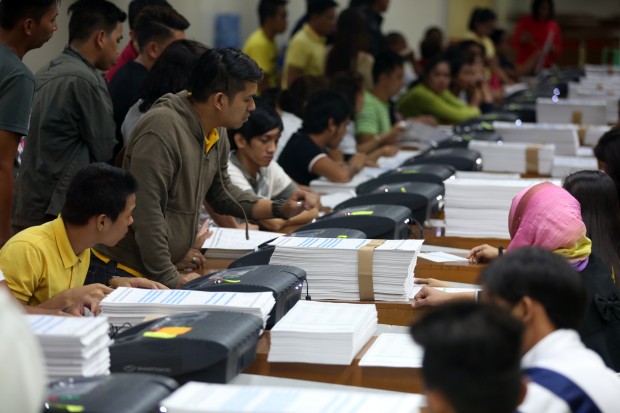SC reminds Comelec to obey ruling on voting receipts

Workers at National Printing Office in Quezon City undergo orientation and verication Process of Precint Count Optical Scan machines.INQUIRER FILE PHOTO
THE Supreme Court has reminded the Commission on Elections (Comelec) that its duty is to enforce the law and the law requires the poll body to activate the receipt-printing feature of the vote counting machines (VCM) to be used in the May 9, 2016 elections.
Under Republic Act 9369, the law that amended RA 8436 or the Automated Election System Law, aside from authorizing Comelec to use an automated election system during elections, the law also introduced the Voter Verification Paper Audit Trail or VVPAT, one of the minimum system capabilities of the automated election system and a major security feature of the vote-counting machines.
Petitioner former senator and now a senatorial candidate Richard Gordon explained that the VVPAT allowed voters to confirm whether or not the machine cast the vote correctly based on their choice, thereby ensuring the integrity of the elections.
He added that VVPAT is a “critical and indispensable” security feature of the automated voting machine.
The Comelec opted to do away with the receipt-printing, saying that it will extend the voting hours. It added that the receipt can be used in vote-buying and could be used by losing candidates to discredit the elections.
But the high court, in the decision written by Associate Justice Marvic Leonen, said Comelec cannot opt to set aside the requirements of the law to assuage its fears regarding the VVPAT.
“Vote-buying can be averted by placing proper procedures. The Comelec has the power to choose the appropriate procedure in order to enforce the VVPAT requirement under the law and balance it with the constitutional mandate to secure the secrecy and sanctity of the ballot,” the high court said.
The high court pointed out that the Comelec cannot do away with what is required them to do under the law because it “is not given the constitutional competence to amend or modify the law it is sworn to uphold.”
If there are policy objections, the high court said the remedy is for Congress to amend the law.
“We see no reason why voters should be denied the opportunity to read the voter’s receipt after casting his or her ballot. There is no legal prohibition for the Comelec to require that after the voter reads and verifies the receipt, he or she is to leave it in a separate box, not take it out of the precinct,” the high court said.
“The credibility of the results of any election depends to a large extent, on the confidence of each voter that his or her individual choices have actually been counted,” the high court added.
The high court noted that it required Comelec to comment on the petition filed by Gordon. But Comelec’s counsel, the Office of the Solicitor General, instead sought an extension to file its comment saying it has not received a copy of the petition and Comelec has not transmitted to them documents relevant to the case.
“It perplexes this court that the Comelec failed to immediately transmit relevant documents to the Office of the Solicitor General to allow them to respond within the time granted,” the high court said adding that the high court’s Clerk of Court en banc told them that both Comelec and the OSG have received copy of Gordon’s petition.
“This court cannot accept the lackadaisical attitude of the Comelec and its counsel in addressing this case,” the high court said.